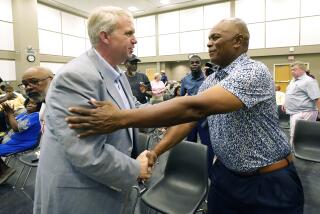Senator Becomes Road Warrior in Battle Against Poverty
TUNICA, Miss. — He came with empty pockets but a full heart, and he left with a solemn vow to keep right on talking, even if the powers-that-be resent his attacks on Washington as a city of politicians with a collective blind eye when it comes to the plight of America’s poor.
But that was enough for many residents of Mississippi’s Upper Delta, who on Thursday turned out in sparse but enthusiastic crowds to embrace another Northern liberal come to talk about their impoverishment.
At a time when consumer confidence is at a 28-year high, fueled by low interest rates, low unemployment and a booming stock market, Sen. Paul Wellstone (D-Minn.) is struggling mightily to launch what he called “an honest national conversation” over issues of “economic justice.”
Trailed by a gaggle of journalists and television crews, Wellstone spent the day traveling through northwestern Mississippi on the maiden voyage of a fact-finding tour across the country that he hopes will force Americans to confront “the faces of poverty.”
Time will tell whether his quixotic sojourn through some of the nation’s poorest communities will stir the nation’s conscience--as did a similar odyssey by the late Sen. Robert F. Kennedy 30 years ago that included stops in many of the same Mississippi towns, setting the stage for his 1968 bid for the presidency.
Recalling Kennedy’s much-heralded crusade for the poor, Wellstone said he finds only inspiration in what he called a “disgraceful” lack of concern for the downtrodden, as embodied by the national experiment in welfare reform.
“Sometimes you have to do it all over again,” he said during a stop in Cleveland, Miss.
On Thursday no one, least of all Wellstone, was deluded into thinking that his tour would bring quick improvement or even make much lasting difference here.
“But it certainly gives people hope,” said Oscar C. Peace, mayor of Hollandale. “The things he’s saying--there ain’t much of it and I listen for it.”
“My minimum goal is to put the issues of race, gender, poverty and children back on the public agenda,” Wellstone said over dinner on the eve of his first outing. “I don’t care if some people want to sweep these issues under the rug. I’m not going to. And if I can succeed in just doing that, I would be very proud.”
But Wellstone also sought to call attention to the efforts of community organizers like Joe Eddie Hawkins, a Tunica man who has helped bring low-income housing to the area.
Wellstone vowed to undertake such a tour as the Senate last summer debated welfare reform, which he fought--becoming the only senator up for reelection in 1996 to oppose the highly popular measure.
He chose to launch his tour here because this is also where his “hero”--Kennedy--had begun. Wellstone was accompanied by fellow Democrat Bennie G. Thompson, Mississippi’s only black congressman, who represents the Upper Delta.
One of the poorest regions in the nation, Tunica County also is known as the birthplace of the blues. About 9,000 people live in Tunica, three-quarters of them black. Its large population of poor rural blacks vastly outnumbers affluent white cotton growers. About half the county’s residents are considered functionally illiterate.
With the advent of gambling on the Mississippi River in the early 1990s, nearly a dozen glistening casinos now line the riverbank, spawning hotels, restaurants and shops.
Yet few of the thousands of jobs created by the casinos went to local residents, who lack needed skills and education, according to Thompson. Instead, many of the jobs went to residents of Memphis, Tenn., 30 miles to the north.
“A lot of the problems associated with poverty still exist,” Thompson said. In fact, he added, “the war on poverty never really became even a skirmish” in many parts of the delta.
He took Wellstone, who was accompanied by his wife, Sheila, to see evidence of such neglect. They slogged through trails of mud to visit with residents who live in shanties with tin roofs and warped floors or in dilapidated trailer homes with broken windows.
The tour also included quick drive-bys of whites-only schools and neighborhoods.
Among those who hailed Wellstone’s trip was Dr. Lovetta Brown, a regional public health officer. “To get real attention, it takes something like this,” she said.
But Wellstone also saw new low-income apartments that have replaced other shanties along what was an open sewer as recently as 10 years ago.
“Things are much better than they used to be” 30 years ago, said journalist Curtis Wilkie, a one-time Mississippi reporter who covered Kennedy’s tour in 1967. Now a Boston Globe staff writer, Wilkie also was with Wellstone here Thursday.
Wellstone acknowledged progress, but added, “It shows us where we need to go.”
Mississippi’s Republican Gov. Kirk Fordice told the Associated Press that Wellstone should go home and deal with his own state’s problems. “He’s using Mississippi as a whipping boy,” Fordice said. “I’m sick of it.”
From here, Wellstone traveled to Cleveland, where he spoke to a conference of delta social workers, urging them to closely monitor the effects of welfare reform.
Like many states that acted before Congress passed the welfare measure last year, Mississippi in 1995 launched its own welfare reforms. Called “Work First,” it has been criticized by activists who say it forces mothers to work regardless of educational levels, cuts food stamps too steeply, imposes a lifetime benefit limit of five years and provides inadequate child care.
In four years, the number of welfare recipients in the state has dropped by 38%, to 108,365, as of January--in part because of the reforms. That decline is nearly double the national rate, according to the U.S. Department of Health and Human Services.
As his day wound down, he seemed to draw new energy from his tour. “I’m a better senator for having come here,” he told a meeting of 75 residents in Tunica.
“I’m going to travel the length and breadth of this country, from Los Angeles to New York,” Wellstone vowed.
“This is the best thing I can do as a senator,” Wellstone said, adding that highlighting poverty will be at the top of his agenda in the remaining years of his second and final term of office.
And if he succeeds in generating a public dialogue and perhaps a national self-examination, he said, “it’d be a dream come true.”
More to Read
Get the L.A. Times Politics newsletter
Deeply reported insights into legislation, politics and policy from Sacramento, Washington and beyond. In your inbox three times per week.
You may occasionally receive promotional content from the Los Angeles Times.










